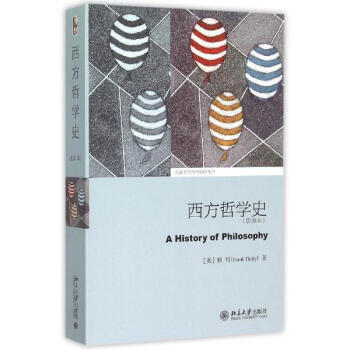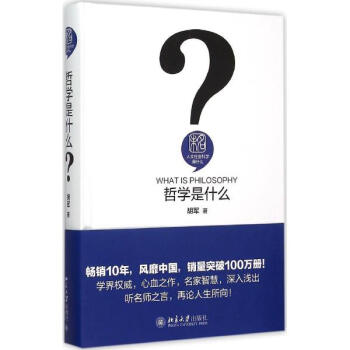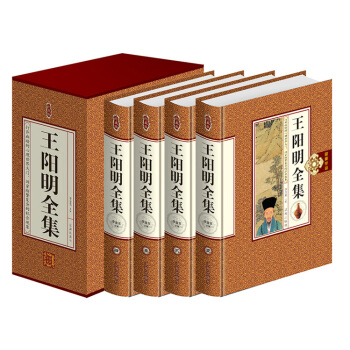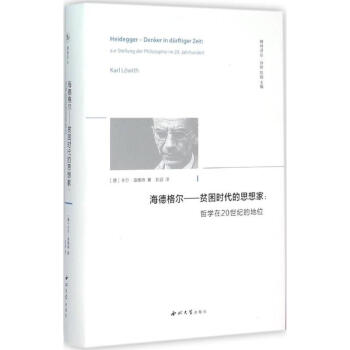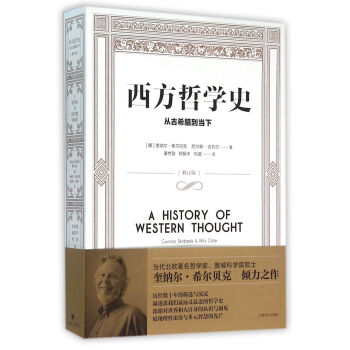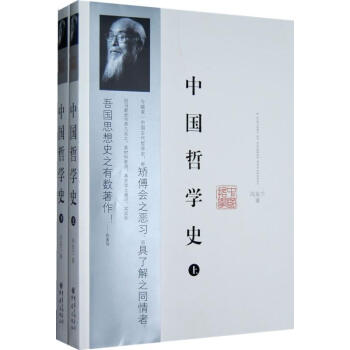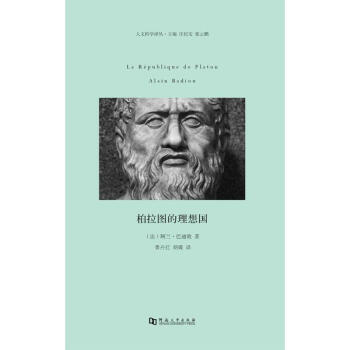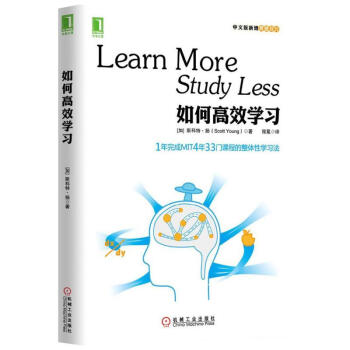具体描述
作 者:(美)弗兰克·梯利(Frank Thilly) 著 著作 定 价:78 出 版 社:北京大学出版社有限公司 出版日期:2015年08月01日 页 数:612 装 帧:平装 ISBN:9787301261750 ●INTRODUCTION
●History of Philosophy
●Science, Philosophy, and Religion
●General Classification
●Sources of Study
●Bibliography
●GREEK PHILOSOPHY
●PHILOSOPHY OF NATURE
●1.OBIGIN AND DEVELOPMENT OF EARLY GREEK THOUGET
●History of Greek Philosophy
●Environment
●Politics
●Literature
●Religion
●Philosophy
●Survey of Greek Philosophy
●Bibliography
●2.DEVELOPMENT OF PBE-SOPHISTIC PHILOSOPHY
●3.PROBLEM OF SUBSTANCE
●Thales
●部分目录
内容简介
《西方哲学史》这本书就是梯利在康奈尔大学教书时编写的教材;出版于1914年,书一出版,立即被哲学界奉为名著,在中华人民共和国成立前的*国也有广泛的影响。 在这之前,几乎没有出版过像样的哲学史,大学里的哲学系也是为各种哲学流派所控制,很少讲授现代意义的哲学史课程。可以说梯利这本书,开创了哲学史教育的新局面,提供了哲学史编写的范本。
可以说,梯利开创了一门学科。 (美)弗兰克·梯利(Frank Thilly) 著 著作 弗兰·梯利(Frank Thilly,1865-1934),美国有名哲学家和哲学史家,曾任教于密苏里州立大学、普林斯顿大学和康乃尔大学。在大学讲授哲学史多年。以其讲义为基础编写的哲学史著作《西方哲学史》一书在西方哲学界颇受好评,已成为美国各大学哲学系广泛采用的哲学史教材。
思想的洪流,理性的回响:一部西方哲学思想的史诗 本书并非简单地罗列哲学家及其观点,而是一部波澜壮阔的思想史诗,它试图勾勒出西方文明精神内核的演进轨迹。从古希腊 Those who ponder the fundamental questions of existence, the nature of reality, and the human condition, have, through the ages, woven a tapestry of thought that continues to shape our world. This comprehensive exploration delves into the very fabric of Western philosophy, tracing its lineage from the earliest inquiries of the ancient Greeks to the complex debates of the modern era. It is not a mere chronological compilation of thinkers and their pronouncements, but rather a dynamic narrative that unveils the evolving tapestry of Western civilization’s intellectual and spiritual core. Our journey begins in the sun-drenched city-states of ancient Greece, where the seeds of rational inquiry were first sown. We encounter the pre-Socratic philosophers, men like Thales, Anaximander, and Heraclitus, who dared to move beyond mythological explanations and sought to understand the fundamental principles governing the cosmos. Their explorations into the _arche_, the primordial substance or principle of all things, laid the groundwork for a systematic approach to understanding the universe. We will witness the genesis of cosmology and metaphysics as these early thinkers grappled with questions of change, permanence, and the underlying order of nature. The luminous era of Classical Greece brought forth intellectual giants whose names still resonate through the centuries. Socrates, the enigmatic gadfly of Athens, challenged conventional wisdom through his relentless dialectical method, the _elenchus_. His emphasis on self-knowledge – "Know thyself" – and his pursuit of virtue as the ultimate good profoundly impacted subsequent philosophical thought. We will explore the Socratic paradoxes and the profound ethical implications of his teachings, which often centered on the importance of reasoned argument and the examined life. Plato, Socrates' most illustrious student, built upon his teacher's legacy, constructing a monumental philosophical system. His Theory of Forms posits a realm of perfect, eternal, and unchanging essences that exist beyond the material world. This dualistic view of reality, separating the sensible from the intelligible, profoundly influenced metaphysics and epistemology for millennia. We will delve into his dialogues, examining his ideas on justice, the ideal state as depicted in the _Republic_, the nature of the soul, and the journey of the philosopher towards the contemplation of the Good. Plato's enduring influence on Western thought, from Neoplatonism to Christian theology, cannot be overstated. Aristotle, Plato's most brilliant student, diverged from his teacher in crucial ways, grounding his philosophy more firmly in empirical observation. His vast contributions span logic, metaphysics, ethics, politics, biology, and physics. Aristotle's development of formal logic provided the tools for rigorous reasoning that would dominate Western intellectual life for over two thousand years. His metaphysics, with its concepts of substance, form, matter, potentiality, and actuality, offered a comprehensive framework for understanding the natural world. His ethical system, emphasizing _eudaimonia_ – human flourishing – through the cultivation of virtue and the practice of moderation, continues to be a cornerstone of moral philosophy. We will explore his teleological view of nature, where everything has an inherent purpose, and his foundational work in categories and causation. The Hellenistic period, following the conquests of Alexander the Great, witnessed the rise of new philosophical schools that grappled with questions of individual happiness and ethical living in a changing world. Stoicism, with its emphasis on virtue, reason, and living in accordance with nature, offered a path to inner peace and resilience in the face of adversity. Thinkers like Zeno of Citium, Epictetus, and Marcus Aurelius championed the idea of _apatheia_ – freedom from disturbing passions – and the acceptance of what lies beyond our control. Epicureanism, on the other hand, identified pleasure, understood as the absence of pain and disturbance (_ataraxia_), as the highest good, advocating for a life of moderation, friendship, and intellectual pursuits. Skepticism, questioning the possibility of certain knowledge, encouraged intellectual humility and a suspension of judgment. The advent of Christianity profoundly reshaped the intellectual landscape of the West. Early Christian thinkers, such as Augustine of Hippo, sought to synthesize Christian dogma with Platonic philosophy. Augustine's exploration of faith and reason, the nature of sin, divine grace, and the City of God provided a rich theological and philosophical framework that would define medieval thought. His introspection and exploration of the inner self in his _Confessions_ foreshadowed later developments in phenomenology. The Middle Ages saw the continued integration of classical philosophy, particularly Aristotelian thought, with Christian theology. Scholasticism, a dominant intellectual movement, aimed to reconcile faith and reason through rigorous logical analysis. Thomas Aquinas, the towering figure of Scholasticism, masterfully synthesized Aristotelian philosophy with Christian doctrine in his _Summa Theologica_. His arguments for the existence of God, his exploration of natural law, and his ethical framework, which emphasized the pursuit of the common good, remain influential. We will examine the work of other significant Scholastics and the intellectual debates that characterized this period, including discussions on universals and the nature of being. The Renaissance marked a renewed interest in classical antiquity and a shift towards humanism. While not a distinct philosophical school, the humanist movement emphasized human potential, reason, and individual worth. Philosophers began to explore political theory with renewed vigor, as seen in the pragmatic realism of Niccolò Machiavelli’s _The Prince_, which detached political action from traditional moral constraints. The dawn of the Scientific Revolution ushered in a new era of inquiry, profoundly influencing philosophy. Empiricism, championed by thinkers like Francis Bacon, John Locke, and David Hume, asserted that all knowledge originates from sensory experience. Bacon advocated for inductive reasoning and the scientific method as the path to true knowledge. Locke’s _Essay Concerning Human Understanding_ proposed the mind as a _tabula rasa_ (blank slate) at birth, with all ideas derived from sensation and reflection. Hume, with his radical skepticism, questioned the foundations of causality, induction, and even the existence of a persistent self, challenging the certainty of scientific knowledge. Rationalism, in contrast, emphasized the role of reason and innate ideas as the primary sources of knowledge. René Descartes, the father of modern philosophy, sought to establish a secure foundation for knowledge through radical doubt, famously arriving at "Cogito, ergo sum" ("I think, therefore I am"). His dualism of mind and body, and his geometrical method of reasoning, profoundly influenced subsequent philosophical discourse. Baruch Spinoza developed a monistic system, seeing God and nature as one unified substance, and applied geometrical methods to ethics. Gottfried Wilhelm Leibniz proposed a universe composed of monads, indivisible spiritual substances, and introduced the principle of sufficient reason. The Enlightenment, a period of intense intellectual and cultural ferment, built upon the foundations of scientific inquiry and rational thought. Immanuel Kant, a pivotal figure, sought to bridge the gap between rationalism and empiricism. In his _Critique of Pure Reason_, he argued that our understanding of the world is shaped by both sensory input and innate cognitive structures, the _a priori_ categories of the understanding. His ethical system, based on the categorical imperative and the concept of duty, remains a cornerstone of deontological ethics. We will examine his ideas on noumenal and phenomenal reality, the autonomy of the will, and the basis of morality. The 19th century witnessed a proliferation of diverse and often competing philosophical systems. German Idealism, following Kant, saw thinkers like Georg Wilhelm Friedrich Hegel develop complex dialectical systems, viewing history and reality as a process of unfolding Spirit or Absolute Idea. His dialectical method of thesis, antithesis, and synthesis profoundly influenced subsequent social and political thought. Existentialism, with precursors in Søren Kierkegaard and later developed by figures like Friedrich Nietzsche and Jean-Paul Sartre, grappled with themes of individual freedom, responsibility, meaning, and the human condition in a seemingly absurd universe. Nietzsche’s critique of traditional morality and his concept of the _Übermensch_ (overman) challenged established values. Kierkegaard’s focus on subjective truth and the leap of faith explored the individual’s relationship with God and existence. In the 20th century and beyond, philosophy has continued to diversify and fragment into various schools and approaches. Logical positivism and analytic philosophy, emerging from the work of Gottlob Frege, Bertrand Russell, and Ludwig Wittgenstein, emphasized the role of logic and language analysis in clarifying philosophical problems. Phenomenology, pioneered by Edmund Husserl and developed by Martin Heidegger and Maurice Merleau-Ponty, focused on the structures of consciousness and lived experience. Pragmatism, originating in the United States with thinkers like Charles Sanders Peirce, William James, and John Dewey, emphasized the practical consequences and usefulness of ideas. Post-structuralism and postmodernism, including figures like Michel Foucault and Jacques Derrida, have questioned grand narratives, power structures, and the stability of meaning. This comprehensive journey through Western philosophy reveals a continuous dialogue, a constant questioning and re-evaluation of fundamental truths. It showcases the enduring human drive to understand ourselves, our world, and our place within it. By tracing the evolution of these profound ideas, we gain a deeper appreciation for the intellectual heritage that has shaped not only Western thought but also global discourse, offering timeless insights into the perennial questions that define our existence.
